Summer is all about grilling burgers, right? Well, it’s currently 93 degrees F where I am and standing over a steel cauldron of hot flames doesn’t sound all that enticing. Instead, I tried cooking my latest bacon cheeseburger in the energy-efficient air fryer and I have to say it went pretty well.
I’m no stranger to the trendy countertop oven. I make loads of things in the air fryer, but resisted making burgers in the oven or air fryer fearing I wouldn’t be able to hit that coveted medium rare internal temp as I ca with cast-iron skillet or gas grill.
Considering all that, making a bacon cheeseburger in an apartment-friendly air fryer is a particularly attractive proposition. And the results of my first, but certainly not last, air fryer cheeseburger experience were nothing short of impressive. What’s more, an air fryer uses very little energy — far less than a big oven or grill.
Here’s how to make an excellent bacon cheeseburger in your air fryer at home.
How to make a medium rare cheeseburger in the air fryer
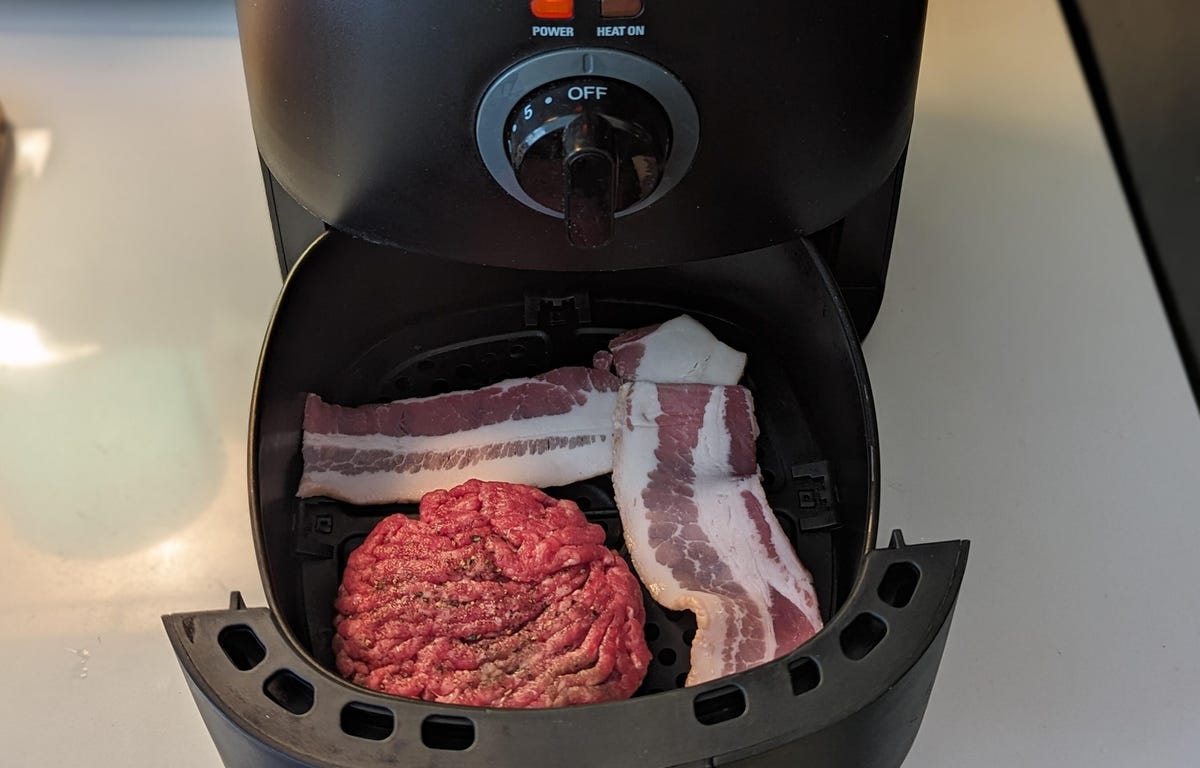
Even a small air fryer can handle a full-sized burger patty and a few slices of bacon at once.
I consulted a variety of different sources for timings and temperatures, but the process is about what you’d expect and similar to that which you’d experience cooking a burger in any manner: flipping the patty about halfway through for even results, with different timings depending on the size of your desired doneness.
Read more: How to Tell When Steak Is Perfectly Cooked Without a Thermometer
The air fryer works by circulating hot air in its contained chamber, so as a matter of interest, your air fryer burger will cook opposite to what you’d see on a sauté pan, with the exposed side of the burger cooking more quickly and becoming browner than the underside of the patty.
I tried two different approaches, both with a quarter pound of lean ground beef, seasoned simply with salt and pepper. First, I shaped a single patty about three-quarters of an inch in thickness, and cooked it at 370 degrees F for 10 minutes, flipping at the halfway mark. Then I tried the same amount of meat shaped into two, thin, smash-style patties for a total cooking time of about six minutes. (Double your cheeseburger, double your fun.)
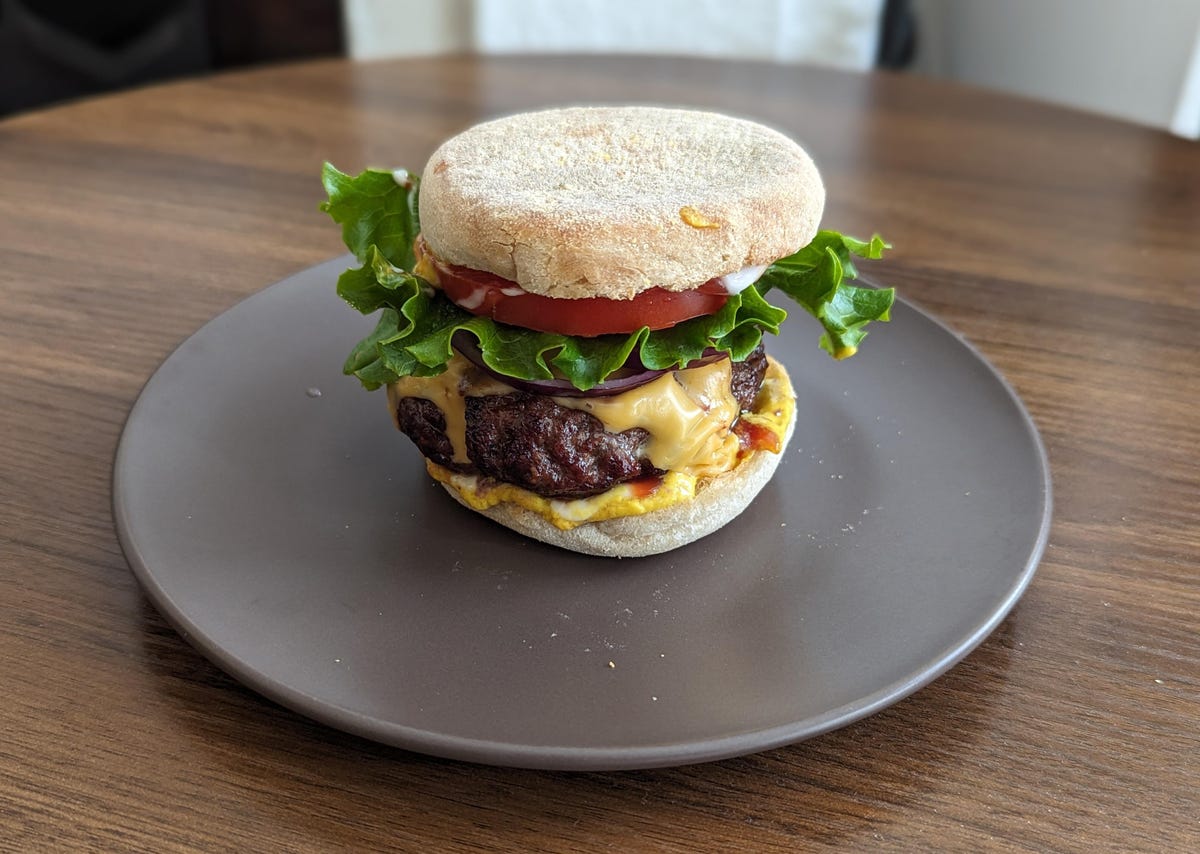
Making a great burger in an air fryer takes almost no skill and requires very little cleanup afterward.
Air fryers require very little cleanup
Well, that was easy. In both cases the patties cooked evenly, with an outcome that was medium in doneness. (You can easily experiment with your model and ideal burger patty size to find the precise timings for your preferred degree of doneness.) The hot air circulation even managed to produce a bit of caramelized crust on one side. Because I could, even with a small, single-household air fryer, I put in a couple of strips of bacon with the single burger patty, since crispy, spatter-free bacon is another excellent use for an air fryer — not to mention an exceptional burger topping.
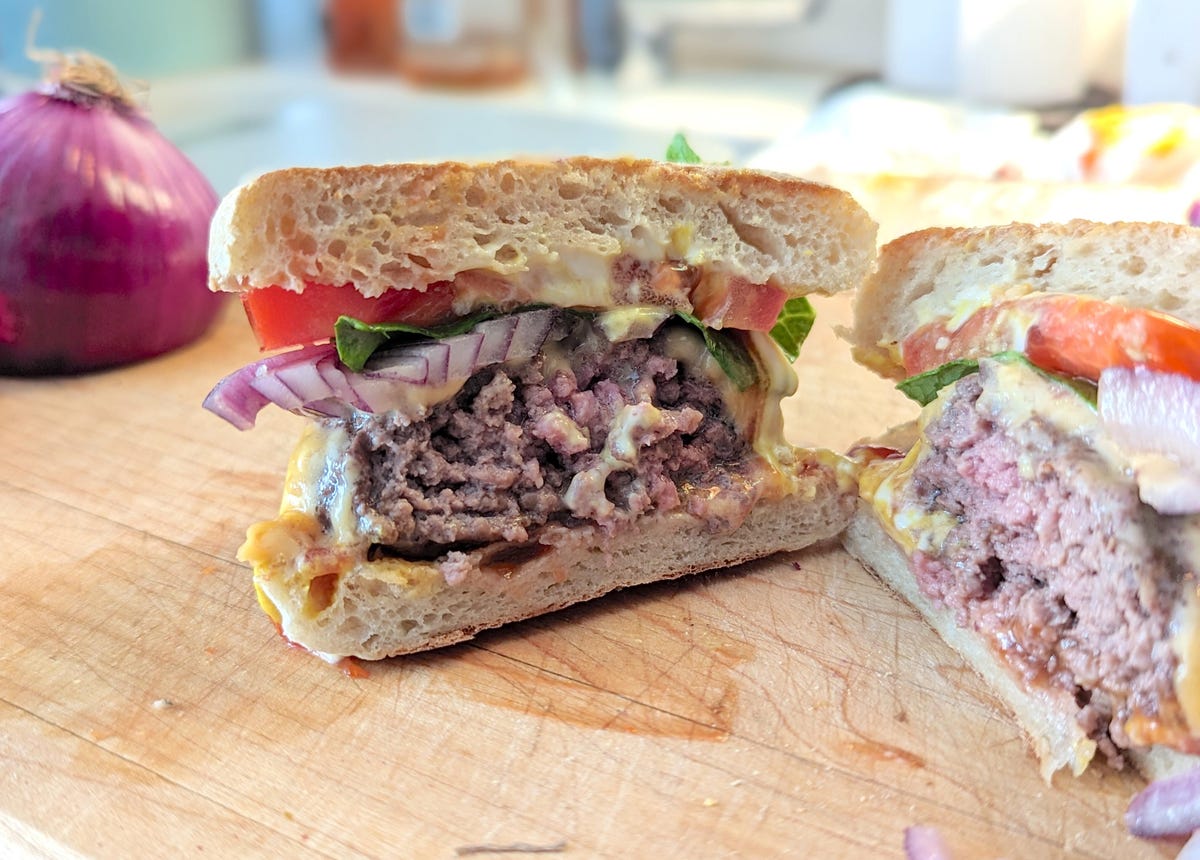
You can cook a burger to that perfect medium or medium rare with an air fryer.
Speaking of spatter-free, this is the single most compelling reason to employ the air fryer for burger prep. Your clothing, skin and stovetop all avoid the sizzling oil droplets that — safely contained within the air fryer drawer — like to escape the pan during regular skillet cooking. The smoky, greasy, meaty aroma, which is otherwise appealing at a burger dive, but not so much in a studio apartment, is also minimized. Cleanup was limited only to the nonstick, air fryer drawer.
Read more: I’ve Been Making Bacon Wrong. Here’s the Best (and Cleanest) Way to Cook it
There are drawbacks to air fryer burgers
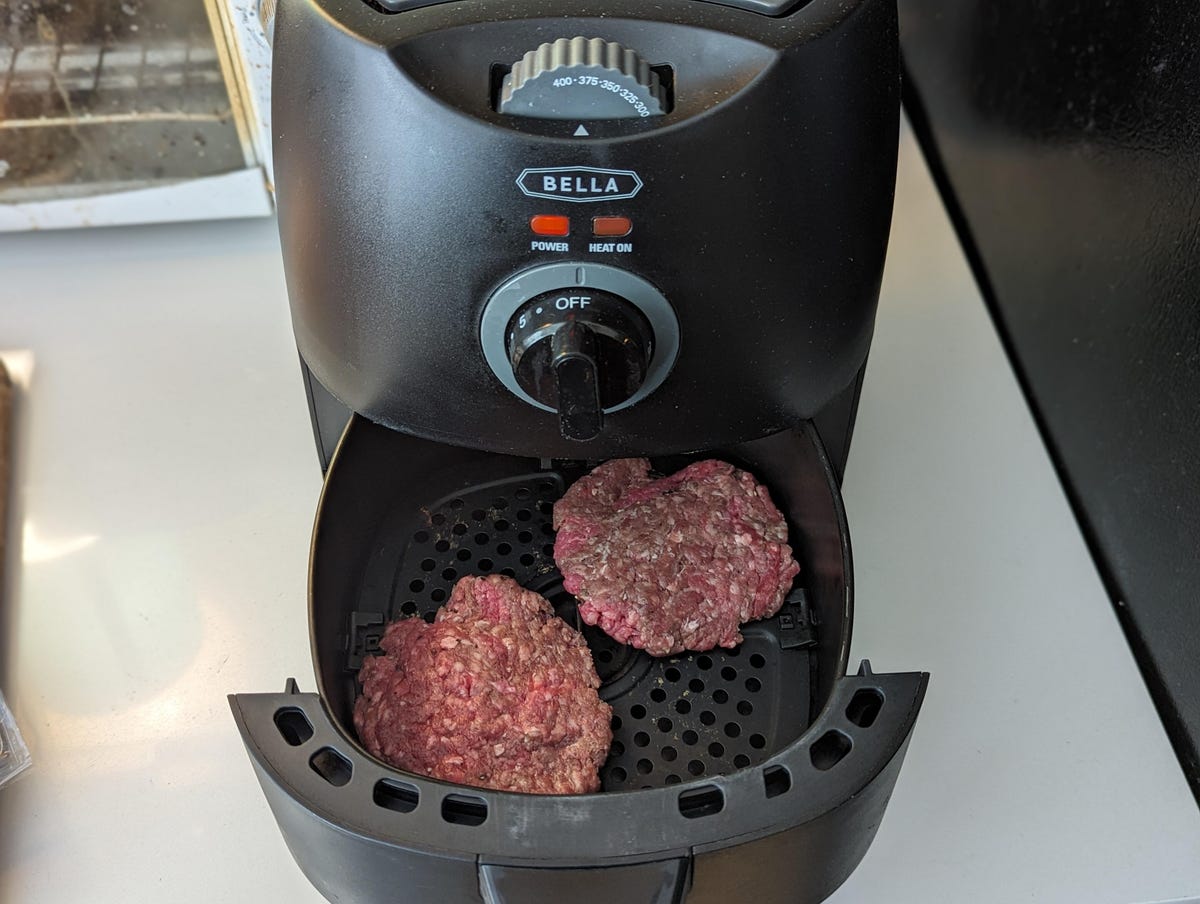
With an air fryer, you can’t smash the patties down as easily as you can on a grill or griddle.
The air fryer isn’t perfect when it comes to burgers, and the drawbacks as I experienced are twofold. First, since you can’t really access the patty while it cooks, you’re unable to smash it down in such a way that it doesn’t shrink up significantly while cooking. Since an English muffin is the best burger containment method — I will not be considering opposing viewpoints at this time — this didn’t bother me so much, since the resulting patty fits the intended vessel perfectly. Expect shrinkage when considering the size of your patty before cooking.
Second, if you’re like me and believe that a burger without cheese isn’t worth eating, things get a little more complicated. Because of the air circulation action of the air fryer, it’s hard to anchor cheese on top for a quick melt at the end of the process. My first attempt with a sliced single, an ideal burger cheese — and I am a cheese pro, so don’t come at me — flew off and unhelpfully adhered to the surface of the air fryer drawer.
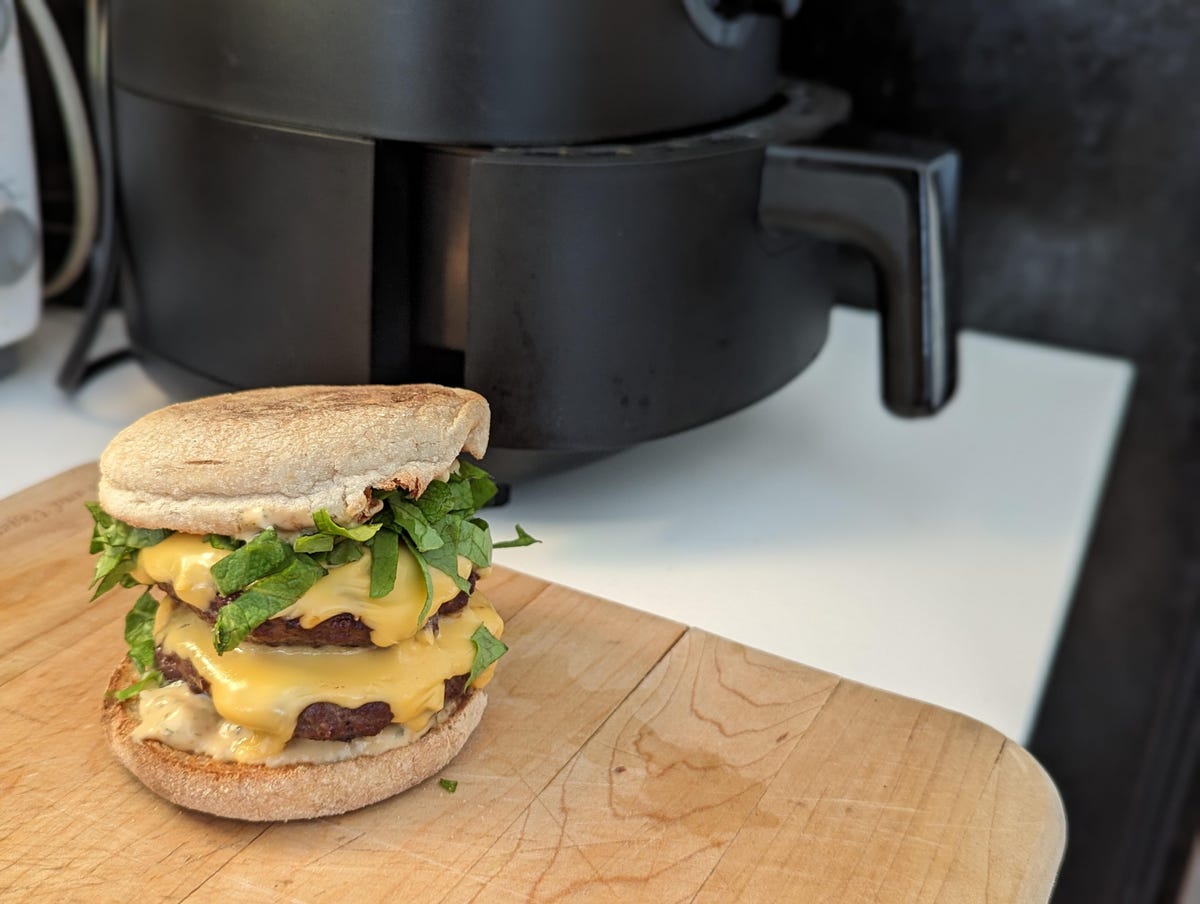
Am I seeing double?
My second attempt where a slice was halved and layered for extra heft was more successful, even more so when I moved the patties to the back edge of the fryer basket which gets less aggressive air circulation. This may just be a quirk of my model, but I’d be prepared to experiment. I wouldn’t even consider shredded cheese on top of a patty, but I absolutely would consider a cheese-stuffed burger, which should work nicely.


















+ There are no comments
Add yours